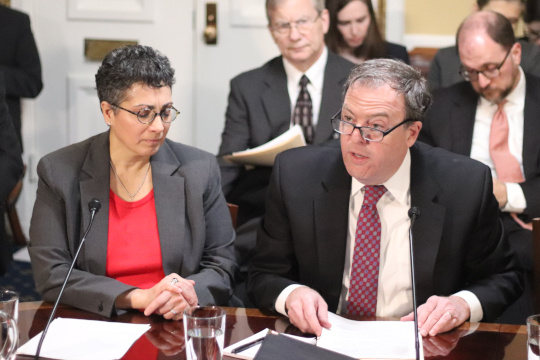
By Krystina Skurk
Chairman Jim McGovern and Ranking Member Tom Cole of the House Rules Committee invited Dr. Matthew Spalding, Dean of Hillsdale College’s Steve and Amy Van Andel Graduate School of Government in Washington, D.C., along with other leading scholars, to testify before the committee regarding “Constitutional Perspectives on the Responsibility and Authority of the Legislative Branch.”
In his testimony Dr. Spalding argued that the expansion of the executive branch is the result of “the prolonged narrowing of the legislative branch,” due to a “decades-long change in American government towards administrative rule and away from the constitutional rule of law.” He argued this shift toward bureaucratic rule, and the resulting legislative-executive competition to control the administrative state, has created a structurally unbalanced relationship between a growing executive-bureaucratic branch and a weakening legislative branch.
Dr. Spalding maintained that Congress’ best tool in asserting its legislative muscle is the “power of the purse.” Responding to a question from Chairman Rep. Jim McGovern on the War Powers Resolution of 1973, Dr. Spalding pointed out that Congress is on weak ground when it challenges the executive’s inherent Article II powers, and is strongest when it uses Congress’ primary Article I budgetary powers.
Throughout his testimony, Dr. Spalding maintained that one of the fundamental problem in the way our government operates today is that it violates core constitutional principles. Most of what today accounts for “laws” are regulations made by unelected administrators who at best are indirectly responsible to the people. Often the same agencies that are making these rules are also enforcing and adjudicating their application. This new form of government is not consistent with the separation of powers or the fundamental republican principle of the consent of the governed.
Dr. Spalding reiterated that if Congress wants to gain back its institutional power it needs to take command of the government through the budget. Further, members of Congress should begin to think more about protecting their institution rather than about protecting their narrow interests, he argued.
As Madison wrote in Federalist 51, “The interest of the man must be connected with the constitutional right of the place.” This is essential to a government that prizes the separation of powers.
You can read Dr. Spalding’s full testimony here.
You can watch the video of the hearing here.